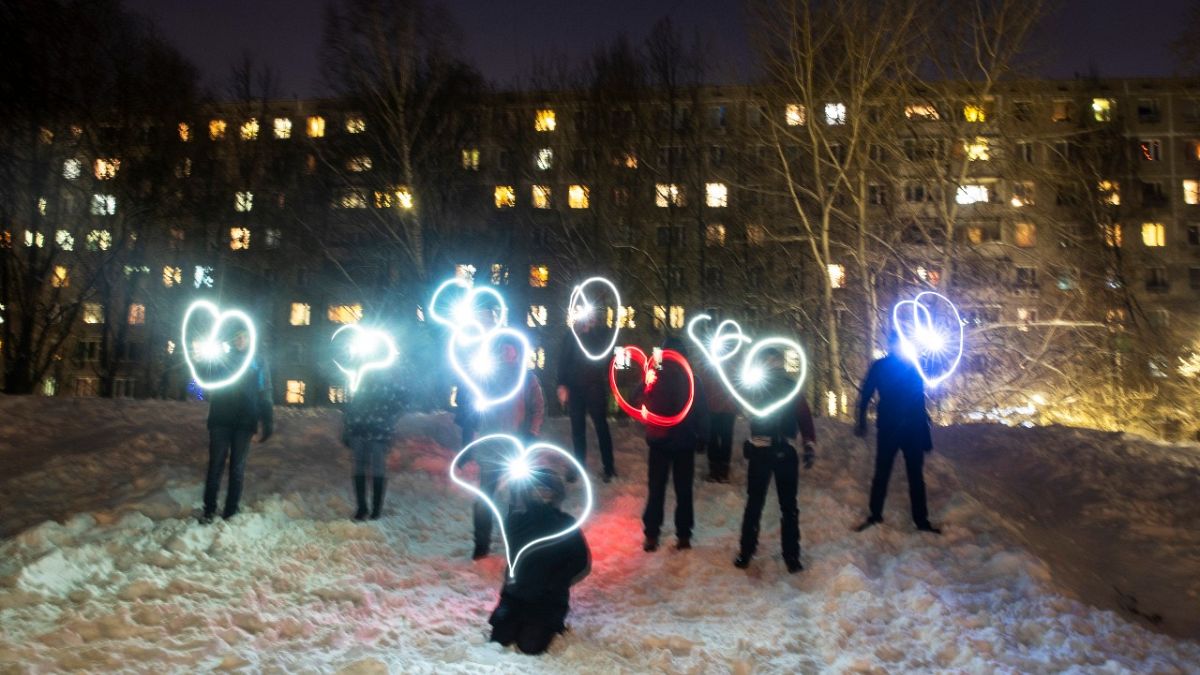The protest, dubbed "Love is stronger than fear," was called by Navalny's allies for Valentine's Day in solidarity with people detained in recent opposition protests.
Supporters of imprisoned Russian opposition leader Alexei Navalny came out to residential courtyards and shone their cellphone flashlights Sunday in a display of unity, despite efforts by authorities to extinguish the protests.
The protest, dubbed "Love is stronger than fear," was called by Navalny's allies for Valentine's Day in what they said was an effort to avoid mass arrests as at previous rallies in January.
Demonstrators were calling for the release of Navalny and other political activists who have been detained in recent weeks.
People uploaded photos of themselves in small groups with lit-up cellphones in cities from Siberia to the Moscow region.
The protest's hashtag was trending with over 21,000 tweets and 8,000 Instagram posts by Sunday evening.
Valentine's Day 'solidarity chains'
Earlier, several hundred women formed human chains in Moscow and other Russian cities in a Valentine's Day protest in support of Navalny's wife Yulia, as well as other women arrested in recent opposition demonstrations.
Around 200 women gathered in temperatures of -13°C to form a "solidarity chain" along a street in the capital's historic city centre to highlight the plight of those they see as political prisoners.
"We want to show that we are for love and against violence. Some very brave and nice women have come here, Darya Obraztsova, a 22-year-old student, told AFP, adding that she hoped to see "freedom and justice reign in our country".
"I'm here to express my opinion as a citizen that I disagree with the destruction of the law in our country," said a woman who gave her name as Alina.
At Saint Petersburg the action drew between 80 and 100 people, according to an AFP journalist. Some women wore flowers or paper hearts inscribed with the names of women symbolising opposition to Russian authorities.
Images published on social media showed them chanting "freedom for political prisoners".
According to the NGO OVD-Info, which specialises in following demonstrations, a similar rally ended with nine arrests in the city of Kazan in Tatarstan.
Navalny's team called on residents in large cities to shine torches, or wave candles or lights from their phones at 8pm, and to publish photos of their actions on social media.
The demonstration was inspired by the anti-Lukashenko movement in Belarus, where giant protests in the autumn were followed by such action in the wake of the authoritarian leader's disputed re-election, which evidence strongly suggests was rigged.
Several protests in support of Navalny, arrested upon his return to Russia from Germany in January and since sentenced to three years in prison, have ended in more than 10,000 arrests across the country.
His support team have said they do not intend to organise more massive demonstrations before the spring, favouring more targeted actions instead.
Putin claims Navalny being used by the West
Russian President Vladimir Putin referred to opposition demonstrations in comments broadcast this weekend.
Regarding protests demanding freedom for Alexei Navalny, Putin said they were being stirred up "precisely at the moment when in countries all over the world, including our own, people are tired, irritated and discontented about the conditions in which they live, their income."
Parts of Putin's meeting with the heads of Russian state media companies, which took place on Wednesday, were broadcast Saturday night on Russian television.
Without mentioning Navalny's name, as is customary for Russian government officials, the Russian president alluded that he is an individual who is "ambitious and thirsty for power" who is being used by the West for their interests.
He added that sanctions and other efforts to limit Russia's growth were part of a policy of containment that grew in proportion to the growth in Russia's strength and accomplishments, among them the development of a vaccine against the coronavirus.
Lastly, the Russian leader said he would not rule out new internet restrictions in the country in case of hostile cyber actions from foreign powers.
Euronews correspondent Galina Polonskaya is in Moscow - watch her report by clicking on the media player above.


